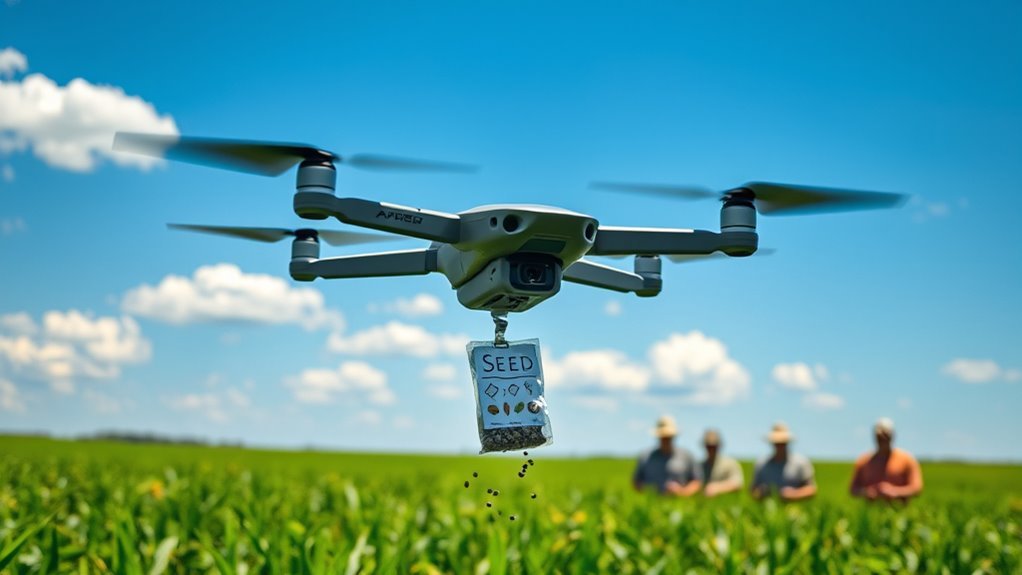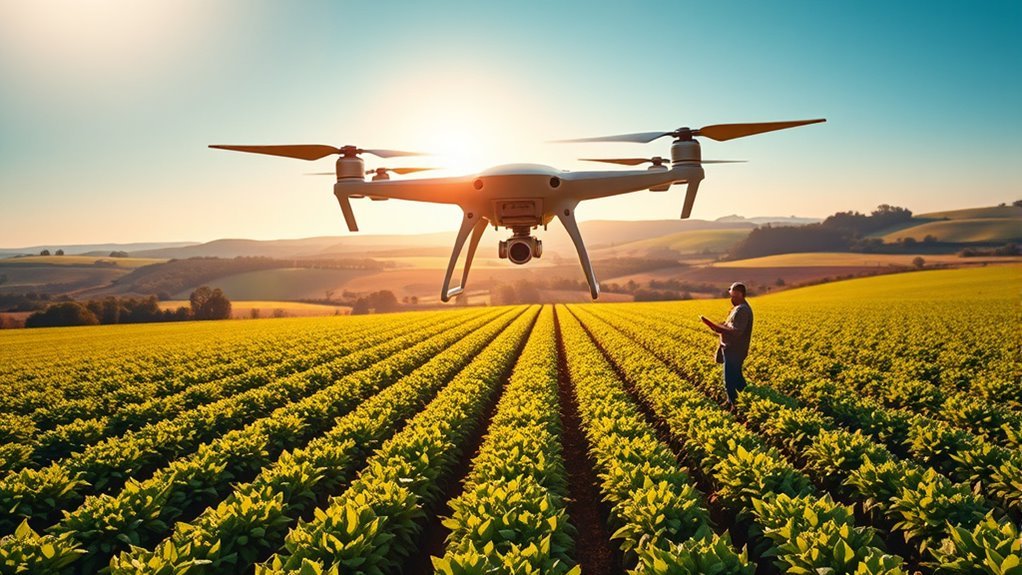Drones are revolutionizing industries today in innovative ways. You can witness faster package deliveries, enhanced agricultural practices, and improved construction site monitoring. They’re pivotal in disaster response, providing rapid assessments and efficient resource allocation. Drones also aid wildlife conservation by tracking populations and mapping habitats. Plus, they push the boundaries of cinematic filmmaking with unique aerial perspectives. There’s so much more to explore about these remarkable applications and their impact on our world.
Revolutionizing Package Delivery

As e-commerce continues to soar, companies are increasingly turning to drones to revolutionize package delivery. You might wonder how this shift impacts urban logistics. Drones, acting as aerial couriers, enable faster deliveries and reduce traffic congestion. Imagine receiving your order within minutes instead of days, transforming your shopping experience.
With their ability to navigate urban landscapes effortlessly, drones eliminate the need for traditional delivery vehicles, cutting down on greenhouse gas emissions and costs. This innovative approach not only enhances efficiency but also offers a sense of freedom for consumers, allowing you to receive packages wherever you are. As technology advances, the potential for drones in urban logistics expands, paving the way for a future where convenience and sustainability go hand in hand. Additionally, autonomous navigation allows drones to chart optimal routes, further boosting delivery efficiency. Drones like the Amazon MK30 utilize advanced sensors to ensure safe and reliable operations in complex environments.
Enhancing Agricultural Practices

While traditional farming practices have their merits, incorporating drones into agriculture is transforming how you manage crops and monitor fields. Drones enhance your ability to collect data and make informed decisions, leading to improved yields and sustainability. Delair’s cameras, for instance, provide high-resolution imaging for crop health monitoring, enabling early detection of issues that could affect yield. Furthermore, advanced crop monitoring solutions leverage drone technology to offer detailed insights into plant health and resource needs.
| Application | Benefits |
|---|---|
| Crop Monitoring | Real-time health insights |
| Precision Farming | Targeted resource use |
| Soil Analysis | Optimized nutrient levels |
| Aerial Spraying | Efficient pest control |
With remote sensing and field mapping, you can conduct soil analysis and optimize irrigation. Drones also aid in yield forecasting and pest management, allowing for timely interventions. Embracing this technology empowers you to farm smarter, not harder.
Transforming Construction Site Monitoring

When it comes to construction site monitoring, drones are revolutionizing the way you oversee projects. With real-time aerial imagery, you can assess site safety like never before, spotting potential hazards before they become issues. This proactive approach not only protects your team but also boosts project efficiency by minimizing delays. You can track progress with precision, ensuring that every stage aligns with timelines and budgets. Drones also facilitate easier communication among stakeholders, providing visual updates that keep everyone informed and engaged. By integrating this technology, you’re not just enhancing oversight; you’re fostering a culture of accountability and transparency. Advanced technology innovations enhance your ability to adapt quickly to changing site conditions and improve overall project outcomes. Embracing drones in construction transforms your ability to manage projects, ultimately giving you more freedom to innovate and excel. Additionally, leveraging advanced geofencing systems enhances operational safety by maintaining precise boundaries during site inspections.
Improving Disaster Response and Recovery
The advancements in drone technology extend far beyond construction site monitoring, finding significant applications in disaster response and recovery. Drones are revolutionizing how we assess situations and deliver aid when it matters most. With their high mobility and capability for aerial assessment, they provide critical insights during emergencies.
Drones are transforming disaster response, providing rapid assessments and vital aid delivery in critical situations.
- Rapid damage assessment: Drones can quickly survey affected areas, offering real-time data to responders. This capability enhances proactive vulnerability identification by allowing teams to determine the most critical areas in need of immediate attention.
- Efficient drone logistics: They can transport essential supplies like food, water, and medical equipment directly to hard-to-reach locations.
- Enhanced coordination: Drones improve communication among rescue teams, ensuring resources are allocated effectively. Additionally, Brinc’s two-way communication facilitates real-time interaction for first responders, allowing them to exchange critical information with those on the ground.
Aiding Wildlife Conservation Efforts
Drones are transforming wildlife conservation by providing innovative tools for monitoring animal populations and mapping habitats. You’ll see how these technologies help researchers gather essential data while minimizing human impact on delicate ecosystems. Furthermore, anti-poaching surveillance tech is playing an important role in protecting endangered species from illegal activities.
Monitoring Animal Populations
As concerns about wildlife extinction rise, innovative technologies like drones are revolutionizing how we monitor animal populations. With their ability to cover vast areas quickly and efficiently, drones enhance wildlife tracking and provide invaluable data for population analysis. This not only aids conservationists but also helps maintain ecological balance.
- Real-time data collection: Drones can gather information on animal behavior and health, essential for wildlife management.
- Minimized human disturbance: By using drones, you reduce the stress on animals often caused by human presence.
- Cost-effective solutions: Drones offer a more affordable means of monitoring than traditional methods, allocating resources where they’re most needed.
Habitat Mapping Solutions
While monitoring animal populations is essential for conservation efforts, understanding their habitats is equally important. Drones revolutionize habitat evaluation by providing high-resolution aerial imagery and data, enabling precise ecosystem monitoring. With this technology, you can identify critical areas for wildlife, track changes over time, and evaluate the health of various ecosystems.
Here’s how drones enhance habitat mapping:
| Benefits | Applications |
|---|---|
| Detailed Surveys | Identifying Wildlife Habitats |
| Rapid Data Collection | Evaluating Environmental Changes |
| Cost-Effective | Supporting Long-Term Studies |
Anti-Poaching Surveillance Technology
When it comes to protecting endangered species, anti-poaching surveillance technology plays an essential role in conservation efforts. Drones equipped with aerial surveillance capabilities are revolutionizing anti-poaching strategies, making it easier to monitor vast areas and respond swiftly to threats. Here’s how they’re making a difference:
- Real-time Monitoring: Drones provide live feeds, allowing rangers to identify poaching activities as they happen.
- Cost-Effective Solutions: Aerial surveillance reduces the need for extensive ground patrols, saving both time and resources.
- Data Collection: Drones gather vital data, helping conservationists analyze trends and improve strategies for wildlife protection.
Enabling Cinematic Filmmaking
Drones have revolutionized the world of cinematic filmmaking by offering unique perspectives that were once limited to expensive helicopter shots or complicated rigging. With drone cinematography, filmmakers can achieve stunning aerial storytelling that captivates audiences. You can explore new angles and heights, adding depth to your visual narratives. The advanced camera capabilities of drones like the Freefly Astro allow for higher resolution footage, enhancing the overall cinematic quality. Additionally, the low-light performance of drones like the Autel EVO Lite+ V2 enables filmmakers to capture breathtaking scenes even in challenging lighting conditions.
| Feature | Benefits |
|---|---|
| Aerial Shots | Unique perspectives and vistas |
| Cost-Effective | Reduced budget compared to helicopters |
| Flexibility | Easy to maneuver in tight spaces |
As you embrace this technology, you’ll find that drones not only enhance creativity but also empower you to tell stories in ways that were previously unimaginable. The freedom they bring to filmmaking is truly transformative.
Supporting Infrastructure Inspections
As technology continues to advance, the use of drones for infrastructure inspections has become increasingly essential. These aerial devices allow you to access hard-to-reach areas while ensuring safety and efficiency. With proper drone maintenance and adherence to safety regulations, you can gather valuable data, reducing downtime and enhancing the overall integrity of structures. Drones like the Flyability Elios, with its collision-tolerant design, are particularly effective in navigating hazardous environments.
- Cost-effective: Drones minimize the need for scaffolding and extensive manpower.
- Rapid assessments: They provide quick, accurate inspections, enabling timely repairs.
- Enhanced safety: Drones reduce human risk by inspecting potentially hazardous areas. Additionally, drones like the Guardian Agriculture Drone offer advanced stabilization and real-time data feeds, further enhancing inspection capabilities.
Frequently Asked Questions
How Do Drones Ensure Safety During Package Delivery?
Did you know 90% of drone deliveries use advanced collision avoidance systems? These technologies enhance delivery accuracy, ensuring packages reach you safely while minimizing risks to people and property, making your experience seamless and secure.
What Regulations Govern Drone Usage in Agriculture?
You’ll find that regulations for drone usage in agriculture focus on safety and privacy. They impact crop monitoring and precision agriculture, ensuring drones operate efficiently while respecting landowners’ rights and environmental concerns. Compliance’s essential for success.
Can Drones Operate in Extreme Weather Conditions?
Yes, drones can operate in extreme weather conditions thanks to advancements in drone resilience and weather adaptation. They’re designed to withstand harsh elements, allowing you to capture data or perform tasks regardless of the environment.
How Are Drones Powered and What Is Their Flight Duration?
Did you know some drones can fly up to 90 minutes? Their power comes from advanced battery technology, which enhances flight efficiency. This allows you to explore vast areas without worrying about frequent recharges.
What Privacy Concerns Exist With Drone Usage?
When you think about drones, consider surveillance ethics and data protection. They can invade privacy, capturing personal moments without consent. You should be aware of these risks, advocating for regulations to safeguard individual freedoms.

